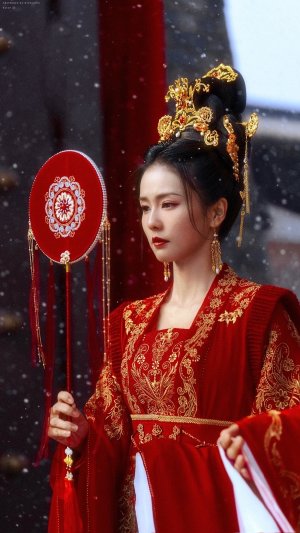
Ridiculously hilarious
I watched Love on the Edge of Divorce with my brain fully switched off and honestly? No regrets. The plot is completely unrealistic, the twists are over-the-top, and the logic took a vacation — but man, did I have a good time! Every time I thought, “there’s no way it can get more dramatic than this,” the writers proved me wrong. Every. Single. Time.Plot logic? Nonexistent — and that’s part of the fun. Random hook-up with your legal spouse you’ve never met? Of course. Him leaping from behind the couch like a budget action hero just to pounce on her for a makeout session? Iconic. One of the most unintentionally hilarious scenes I’ve ever seen. I can’t stop imagining how many takes it took to film that without the actors breaking down laughing. And not recognizing your own wife for three years? Totally fine, I guess — except… who took that marriage registration photo? And then she shows up to design his villa under a fake name, and he ends up falling for her all over again? Naturally. Just another day in this drama’s reality.
The main couple somehow makes it work despite the plot being held together with chewing gum and slow-mo stares. He’s basically a walking checklist of red flags — controlling, intense, emotionally unavailable, and she spends most of the show caught between pretending to resist and letting him bulldoze his way into her personal space. Would I tolerate this in real life? Absolutely not. Did I eat it up in this chaotic drama? Without hesitation.
Honestly, a better twist would’ve been Penny returning on purpose—fully aware of who he is — with the intention to seduce and dump him after the disrespect she faced from him and his mom. Watching her get caught in her own revenge plot and fall for him anyway? Now that would’ve made her choices feel more deliberate and her emotional journey more satisfying. But instead, we got the accidental identity hide-and-seek version, which still worked in a chaotic way.
The side characters held this wild script together, delivering dramatic nonsense with straight faces and surprisingly decent acting. If you're expecting logic, coherence, or realism—this ain’t it. But if you’re here to laugh, cringe, roll your eyes, and have a ridiculous amount of fun? Welcome aboard. This show is six hours of pure, entertaining nonsense—and I loved every minute of it.

Liu Xue Yi plays those morally grey characters like nobody else!!!!!
Coming into A Moment But Forever after the anime, I was hopeful. Hopeful that the drama would keep the emotional core intact while adding layers only live-action can give. And in many ways, it does. But as I sit here, 24 episodes in, I find myself still waiting for the emotional breakthrough, for the love that’s been brewing beneath the surface to finally rise to it.I appreciate that the drama chose not to follow the anime beat for beat. The divergence is welcome. It gives the story breathing room, a chance to explore new angles. But I also can’t help but wish that the leads had been allowed to embrace their feelings sooner. Instead, we’re still caught in this careful distance. It’s frustrating — because I feel the story is clearly aching to unfold.
Liu Xue Yi is, without question, the soul of this drama. He brings a remarkable level of depth and complexity to Yuanzhong, a character shaped by immense loss and years of restraint. Liu Xue Yi excels at portraying grey characters that walk the line between light and shadow and Yuanzhong is no exception. His quiet strength, his barely-contained power, and his nuanced emotional shifts lend credibility to a man who has been locked away for six decades, yet remains a formidable presence. One that even the clan elders do not dare to underestimate. His performance holds both tension and vulnerability, which creates an internal conflict that is compelling to watch.
Tiffany Tang’s return was something I looked forward to... And struggled with. I loved her in Princess Weiyoung, and seeing her here felt almost like seeing an old friend. But that warmth faded quickly. As Tanyin / Goddess Wushuan, she feels distant, stiff — especially in scenes that were supposed to carry emotional weight. It’s not that the character needs to be overtly expressive, but there’s a lack of spark between her and Yuanzhong that’s hard to ignore. She reacts, but rarely resonates. It’s as if she’s reciting grief and longing, rather than feeling them. And that makes it difficult to believe in the love story the show keeps telling us is central.
There is a relationship that does feel emotionally grounded: Yuanzhong and Tang Hua. Their friendship carries the weight of betrayal and the slow, painful work of forgiveness. The moment Yuanzhong chooses to let go of his anger toward Tang Hua, despite learning the truth about his family's murder is heartfelt. It’s a reminder that trust, when rebuilt, can be more powerful than resentment.
Also, about Tang Hua — him and Zhi Dai have something quietly sweet building between them, but it’s so slow. They’ve waited a lifetime already, and it’s starting to feel like the drama is dragging its feet. There’s this gentle connection between them. But at this pace, it’s in danger of being buried under the weight of all the other plots. These two deserve more than subtle moments and glances. I’m hoping the drama gives them the space to truly blossom before we’re all left waiting another lifetime.
Then there’s Fu Jiuyun, introduced to Yuanzhong and Tanyin by the ever sympathetic Mei Shan. Jiuyun's arrogance is both intriguing and amusing, but what’s more interesting is what he brings out in Yuanzhong. The quiet storm of jealousy, the way Yuanzhong’s barely-maintained composure begins to slip, tells us more about his feelings for Tanyin than any romantic speech could. The restaurant scene, where she leaves him waiting while meeting Jiuyun, says everything he cannot: the way he lashes out about the cold noodles isn’t about food, it’s about pain. It’s the only way he knows how to voice a heartbreak he doesn’t feel entitled to. Because Yuanzhong is caught in a contradiction — he doesn’t trust her, even though he wants to. She’s died for him, twice. She’s proven, in every way that matters, that he’s her choice. And yet, he still doubts. Still holds himself back. But when that other man comes into the picture, all that doubt becomes panic, and that panic erupts. He’s in love with her, desperately so, and yet can’t seem to stop questioning her. And that’s what makes it so painful to watch. He’s not just afraid of losing her. He’s afraid he might never be able to let himself believe in her.
One aspect I genuinely struggle with is the inconsistency in how Ji Tanyin sees Yuanzhong. She forgives Qian Lin, a LITERAL war demon, with barely a pause. She never shows any prejudice toward his kind. There are good and bad people everywhere, irrespective of their race. But the moment Yuanzhong’s potential transformation into a demon is mentioned, she recoils, immediately questioning him. It undermines her own moral compass and feels unfair, especially given everything Yuanzhong has endured. It’s hard to reconcile her actions with the values the show claims she upholds, and it adds a layer of cognitive dissonance that detracts from her character’s depth.
At 24 episodes in, I’m still watching. Hopefully, the remaining episodes will bring more emotional resolution and a deeper sense of connection between the leads.
*********************************************************************
⚠️ UPDATE : To be fair, a friend pointed out an important nuance that recontextualizes Tanyin’s reaction. In the drama, Yuanzhong isn’t facing the risk of turning into a demon in the typical "race/species" sense — like Qian Lin, but rather something far more insidious: a perverse, demonic heart. It’s not about bloodline, but about internal corruption. When that dragon in the sea of consciousness speaks of the one that wants to devour him — it is a metaphor for Yuanzhong losing himself entirely to darkness. The series plays with both interpretations of “demon,” and the translation likely blurs that distinction.
Still, even understanding this, I can’t help but feel disappointed by the way Tanyin reacts. No heart, as demonic as it might be, is beyond redemption — especially when it’s still clinging to a ray of light. Yuanzhong has already shown that he’s fighting to hold on, and instead of responding with suspicion, Tanyin could have chosen faith — could have looked for a way to help him stay on the path.
But perhaps the real flaw lies in the premise she set: allowing him to live with the divine hand under the condition that he is “good.” It wasn’t trust; it was a conditional reprieve. And the moment that condition seemed at risk, her judgment was swift. That lack of grace cuts deep, not just for Yuanzhong, but for me as viewer who has been rooting for his redemption all along.

I fell for the plot faster than Wei Shao folded for Man Man
Wei Shao barks more than he chews, and let’s be honest — he lives for the drama. From the second he laid eyes on Man Man, he was done. Like, done-done. Sure, he kept mumbling about sending her home, but his soul had already packed up and moved in with her. That man folded faster than an origami swan.The show did a good job in giving the historical context. You could see he was completely bewitched by her, yet despite the evident attraction, he married her reluctantly, carrying grief, resentment, and about a decade’s worth of emotional repression.
Her beauty may have caught him, but what kept him was everything else — her wit, her love for the people, her strategic mind, the way she saw him when everyone else just needed him. Somewhere along the way, she became his safe place. She was the only person who didn’t drain him. She gave, too. So seeing him pretend not to be absolutely over the moon for every one of her attention, just to be caught red-handed in front of the mirror trying on the things she made for him... Sir. Please. You’re not fooling anyone.
He fell first, but she fell harder. Watching Man Man trying — softly, cleverly, and very strategically — to close that distance between them, while he remained blissfully unaware, was comedy gold. She was dropping hints, putting in real effort, and he was just standing there clueless. I was like ‘Sir? Read the room???’
What makes them work is their tacit understanding. Their non verbal communication is second to none. Qiao Man doesn’t just love him — she understands him. Knows when to hold back, when to act, when to push. And Wei Shao? For all his stubbornness, will stand up for her in a room full of knives.
Also, shoutout to the writers for not diluting her agency the second she got married. From day one, she was offering real solutions, negotiating for Yangzhou and playing the political game like she’d been doing it all her life.
And the chemistry? Even when they’re at odds, you can feel the tension simmering under every line. It’s sweet, it’s funny, it’s occasionally unhinged—and it works.
Oh—and their attendants? Agents of chaos. Meddling, noisy, hilarious. Every one of them is a supporting character worth their own spinoff.
Now, I have to scream about Liu Duan Duan as Wei Yan, Wei Shao’s cousin. My beloved second prince from Joy of Life is back, and he is acting with so much panache, it’s actually illegal. Every time he’s on screen, I’m either cracking up, side-eyeing everyone else, or just thrilled. He plays it with such flair — sharp, layered, funny without ever being cartoonish. He’s that last dash of spice that turns a great drama into a masterpiece. I’m obsessed. More of him in everything, please.
However, what's a complete miss is the duo of A’Fan and Bi Zhi. The second they show up, the energy in the room just evaporates. Like—who told the writers this subplot was giving?They walk in, and I’m suddenly hit with an overwhelming urge to do chores I’ve been putting off for weeks. Fold laundry. Stare into space. Literally anything else. It’s not even dislike — it’s that specific kind of boredom where you know you’re supposed to care, but your brain is just buffering like, “No thanks, I’ll pass.”

A journey of love, trust, and unlikely alliances unraveled.
Some stories don’t just tell a tale — They pull you into their world. If you've ever watched a period drama and thought ‘if only the characters had more depth’, then Are You the One is the show you’ve been waiting for. It is a masterpiece of storytelling woven with love, duty, and fate.At first glance, it may seem like another romance set in turbulent times, but it is so much more than that. It’s a story of love, friendship and unexpected alliances, where bonds are formed beyond just romance. Every relationship is layered, built on trust, understanding, and the strength to accept the past — whether by transcending an old rivalry or choosing to move forward despite lingering emotions.
At the heart of this drama are Liu Miantang and Cui Xingzhou, Prince of Huaiyang. Their relationship begins in an unusual way — rooted in deception and mistaken identity. What starts as a cold, distant arrangement, slowly transforms into something deeply moving. Xingzhou, initially pragmatic and emotionally closed off, sees Miantang as little more than a burden at first. But as he witnesses her resilience, intelligence, and unwavering kindness, his carefully guarded heart begins to thaw.
Miantang, for her part, starts off unaware of her true past, yet she faces every challenge with strength and grace. Despite Xingzhou’s initial distance, she refuses to be broken by circumstance. Her warmth and tenacity gradually break through his walls, making him confront emotions he never intended to feel. The slow burn of their romance is exquisite — filled with tension, misunderstandings, and moments of quiet tenderness that make their eventual love all the more powerful.
Every exchange between them is charged, not just because of what is said, but because of how it is said. Xingzhou’s voice — low, steady, laced with authority — becomes a presence of its own, carrying weight in every word he speaks. It is the kind of voice that demands attention, that makes silence feel like a deliberate choice rather than an absence of sound. And Miantang, sharp as ever, is never one to simply listen — she challenges him, meets his intensity with her own, and forces him to see her not as an obligation, but as someone he cannot ignore.
As their bond deepens, it becomes something neither of them had planned for. Their relationship is not built on grand gestures but on trust, mutual respect, and shared struggles. By the time they fully accept their feelings, it’s not just a romance — it’s a bond forged through hardships and battles, making their love story incredibly rewarding.
And all the while, there’s an unexpected source of humor woven into their journey: Xingzhou’s loyal but hopelessly meddlesome staff. What starts as a group of stern, disciplined attendants quickly turns into a band of reluctant accomplices, covering for Miantang’s antics, softening Xingzhou’s sharp edges, and slowly but surely betraying their own growing fondness for the woman they were once wary of. Their attempts to balance duty with the impossible task of resisting Miantang’s charm result in some of the most amusing moments in the series — proof that even the most disciplined warriors are no match for the sheer force of her presence.
Beyond their relationship, the drama’s depth is further enriched by Ziyu and Xueji, a couple whose dynamic is just as fascinating but takes a different form. Xueji is one of the most remarkable figures in the series — not because she fights for Ziyu’s love, but because she never has to. She sees him, truly sees him, including the lingering attachment he carries for Miantang. She understands her husband, in ways no one else does. Yet, rather than allowing jealousy to consume her, Xueji chooses to stand by Ziyu, not out of blind devotion, but out of a profound, unspoken friendship and gratitude. She sees the burdens he carries and supports him in ways no one else can, proving that love is not always about possession but about understanding.
One interesting dynamic in the drama is how these four individuals, each with their own histories and wounds, manage to work together when it matters most. Despite the tangled past between them, Miantang, Xingzhou, Ziyu, and Xueji form an alliance built on mutual respect, shared goals, and an understanding that some bonds transcend personal feelings. Their cooperation is one of the most satisfying elements of the story, demonstrating that even when love is complicated, trust and friendship can endure.
This is a drama for those who crave depth in storytelling, for those who love complex characters and carefully crafted relationships. If you appreciate historical dramas that balance romance with strategy, and personal struggles with political ambition.

The longing stayed in the drafts, it never reached the FL's face
Started watching for the looks. Let’s be real — especially for Song Weilong. I first discovered him in Untouchable Lovers. That drama was a mess (capital M, double S), but somehow, he still caught my attention. AND he’s ridiculously good-looking, so here we are.Also heard a lot about Angelababy, and this was my first time watching her in action. Wow. Just… wow. I clearly haven’t missed much.
Now, about the actual drama. It’s called Everlasting Longing, but I’m 20 episodes in, and I keep asking myself: IS THE LONGING IN THE ROOM WITH US??? Because I sure don’t feel it.
Their interactions are so stiff, I’m starting to wonder if they filmed their scenes separately and just edited them together later. The male lead? Oh, he’s very intentional about his feelings. He’s laying it all out — fighting for her, making sacrifices, practically bending over backwards to make this relationship work. And the female lead? Well, she’s there. Existing. She’s allowing herself to be loved, which is nice, I guess? But where’s the yearning? The heartbreak? The inner turmoil?
ML is giving us conflicted but passionate lover fighting against fate while FL is giving us… mildly interested observer. I wanted to see in her face, in her eyes, the same struggle between love and duty that he’s clearly going through. Instead, it feels like she’s just going along with it because, well, why not?
And let’s talk about how both ML and FL are constantly described as the most intelligent people in the room. Yet somehow, neither of them have developed a single interpersonal skill. Make it make sense.
Oh, and the switching brides at the wedding twist? The most ridiculous thing I have ever witnessed. I don’t even have the words. Well, I do, but they’re mostly just a series of confused and frustrated noises.
But will I keep watching? Of course. Because Song Weilong is an absolute snack, and I’m only human.
*********************************************************************
So, I finally finished Everlasting Longing. And sure, it was a happy ending (I guess that’s what it was?), but honestly, I feel like there could have been more — more depth, more emotion, more anything — than what it ultimately ended up delivering.
I understand the whole pudeur in costume dramas; I wasn’t expecting steamy romance or grand displays of passion. But my God, the way they avoided physical contact almost felt like an Olympic sport. They were supposed to be madly in love, but where was the madness? Where was the passion?
I wanted to see that burning desire in their eyes, in their body language, in the way they looked at each other like the world could collapse around them and they wouldn’t notice. Instead, I got long stares that felt more like "Should I say something? No? Okay, I’ll just keep staring." If there was any passion, I clearly missed it—or maybe it was just so subtle that it evaporated before reaching the audience.
If there was any suffering, any heartbreak, any deep, undying love, he was the one showing it. The man was ready to go through fire and brimstone for FL, and yet… did she love him? I guess? Did it show? If it did, I clearly missed it.
The ML’s devotion was never in question — he was all in, fighting battles (literally and figuratively), making sacrifices, constantly proving his love. Meanwhile, the FL? She just sort of existed in the relationship. She wasn’t opposed to his love, but she never truly matched it. I kept waiting for that moment, the one where her emotions would break free, where I’d feel that she wanted him just as much as he wanted her. But nope. If there was an ounce of fiery passion in her, it was buried so deep even she couldn’t find it.
This isn’t to say she didn’t love him at all, but love in a romance drama should be felt, not just implied. I wanted to see it in her eyes, in her actions, in the way she responded to his unwavering devotion. Instead, her love felt more like, "Well, if you insist." And for a drama that promised longing, I expected way more than this lukewarm participation.
In the end, did I enjoy watching? I mean… I don’t regret it. But will this be a drama I revisit for its epic love story? Absolutely not. The aesthetics were great, the leads were pretty, but the longing? Let’s just say it never truly left the drafts.
Before I wrap this up, I have to give a special shoutout to Luo Zhizhou. Because let’s be honest — he was gorgeous. Every time he appeared on screen, I momentarily forgot my frustration with the main couple and just appreciated the visual blessing that was Yao Chi.
But it wasn’t just the looks. His portrayal of a clan leader torn between brotherhood and love actually hit. You could feel the weight of his decisions, the pain of betraying a friend, the silent heartbreak of wanting someone he couldn’t have. His conflict with Xuan Lie, his longing for Li Fan Yin. And at this point, I’ll take whatever longing I can get in this drama.
Honestly, if the main love story had even half the emotional depth that Luo Zhizhou carried in his internal suffering arc, I’d be writing a very different review right now.

Two lovebirds who need therapy, not a divorce, but I'm rooting anyway
This show had no business being this good. It’s the story of Xu Yan and Shen Hao Ming — a couple whose chemistry has no right to be that intense. The kind of tension that makes breathing optional.Xu Yan is bruised, messy, but fiercely ambitious. Shen Hao Ming is methodical, composed, manipulative; there’s an eerie calm to him that makes you wonder what dark secrets hide under that perfectly tailored, gentleman-esque exterior. Xu Yan loves him despite knowing the difference in their status. His family’s reluctance to accept her pushes her to lie about her family background just to fit in.
He’s flawless — at least on the surface — the dream man of half the city. But behind that charm is a man so afraid to lose control that he’d rather destroy love than risk vulnerability. For every lie she told thinking she was in control, he was always two steps ahead. Their relationship was built on illusions, and when the truth finally explodes, it’s too late: she loves him but can’t be believed; he loves her but is too good at pretending he doesn’t. Yet love doesn’t ask for permission — it lingers, bruised but unbroken.
The way he degraded her, thinking money and status could cage her forever — and then that priceless look on his face when she hit him with the divorce agreement? Cinematic gold. I lived for that moment. She reclaimed her dignity, turned down everything he’d given her, and started over on her own terms. That’s when the push-and-pull began — when he realized he needed her far more than she ever needed him. The gentleness, the unspoken longing, the way he finally learns to trust her — only for her to no longer know what’s real...
This isn’t just a love story; it’s a war between pride and vulnerability where both sides lose, and somehow you still cheer. "Love’s Ambition" is smart without being cold, romantic without being naive. Xu Yan and Shen Hao Ming are the kind of couple who make you scream “just kiss already” and “please get therapy” in the same breath. When they’re pretending to be in love for business deals, it almost hurts how real it feels — because deep down, they never stopped choosing each other, even when pride got in the way. Every interaction feels like a negotiation between desire and damage. You can’t even tell if they’re flirting, fighting, or foreclosing emotional debt. The tension is so thick you could cut it with Xu Yan’s divorce papers.
By episode 26, I was smiling through tears and yelling at the screen like it could hear me. Their love has evolved from calculated to cautious, from performance to something painfully sincere. They’ve broken each other, rebuilt each other, and now everyone around them sees it — even his mother, who caught them kissing and basically turned into the head of their fan club — yet they’re the last to admit it, still busy overthinking.
That’s what makes "Love’s Ambition" so addictive: it’s not about perfect love, it’s about messy love that survives anyway. It’s funny, infuriating, and tender all at once, the kind of show that leaves you yelling at the screen, smiling through tears, and believing in second chances right before reminding you how badly the first ones can burn.
I'll reserve the last 0,5 for the ending. If it's a happy one then it's an easy 10. If not (which I dread), this masterpiece keeps its very solid 9.5
⚠️ UPDATE _______________________________________________________________
HAPPY ENDING ! I won in life ☺️

A love story too heavy to breathe, even in its tenderest moments
Feud had all the right ingredients: a cast I admire, a premise rich with tragedy and longing, and a world built to test the limits of love. And yet, for me, it never quite became the story I hoped it would. On paper, Hua Ruyue and Bai Jiusi should have been unforgettable — two souls tied by fate, torn apart by grief, and bound together again by the stubborn endurance of love. But watching them, I rarely felt joy in their bond. Even their happiest times seemed weighed down by shadows, as if their love existed only in the margins of sorrow. It was never just about misunderstandings or bad timing — it was about two people whose fundamental ways of seeing life and mankind often felt irreconcilable.That doesn’t mean the drama lacked power. On the contrary, its exploration of grief, guilt, and moral ambiguity carried real weight. Hua Ruyue’s compassion, twisted by loss, and Bai Jiusi’s quiet devotion, smothered by silence, made for a pairing that was layered but unbearably heavy. Their love wasn’t soft tragedy like in One and Only, where fleeting joy made the heartbreak all the sharper. In Feud, joy was barely allowed to exist at all. And that’s where the drama lost me. Instead of feeling the ache of love shining through pain, I felt buried under the pain itself. It’s a beautiful, well-acted story — intelligent, somber, and full of depth — but for me, it lacked the balance that makes heartbreak worth enduring.

Five hundred years of fury, cooled by an accidental vacationer
When Destiny Brings the Demon carries the same soul-stirring energy I felt with Love Between Fairy and Devil and to some extent, Till the End of the Moon. It takes familiar elements—the almighty yet wounded male lead, the candid yet quietly transformative female lead—and shapes them into something both reminiscent and refreshingly its own. Where Till the End of the Moon sometimes felt weighed down by its relentless angst and labyrinthine complexity, this story found the right balance between pain and resolution. The different lifetimes the leads experienced were woven more fluently, creating a flow that was poignant without becoming overwhelming.The premise? Brutal but brilliant. Greed rots everything in this world—even to the point of celestial cultivators devouring their own kind for strength. Sima Jiao, born with a bloodline they coveted, became their sacrificial lamb. For five hundred years, he was imprisoned, his life force drained to feed spiritual energy and shield the heavens from demonic incursions. He was their protector and their prisoner, used until resentment burned through every part of him. His vow for freedom, and to turn those parasites into the prey they made him, carried a raw, aching weight.
Into this world steps Liao Tingyan, a modern woman who only wanted a little vacation, not a front-row seat to celestial politics. Thrown into this brutal world with no clue about its history, powerless and unprepared, she tried to coast along unnoticed, to survive quietly, doing as little as possible and make small joys out of her strange new life. Fate had other plans: she became Sima Jiao’s palace attendant. What began as reluctant service gradually became something more. Somehow her laziness, her will to just enjoy life in the middle of chaos, brought a strange calm to his raging fire.
The plot as a whole was thoughtful, though not without flaws. The villains were too one-dimensional, their schemes too shallow to convincingly threaten Sima Jiao. And while Tingyan’s growth was satisfying in spirit, her sudden leap to ruler never fully convinced me, even with the power he passed on to her.
But the romance? That’s where this story absolutely shines. From their first meeting—her staring at his ridiculously pretty face while he’s slaughtering people and splashing blood everywhere (romantic, I know)—to their tense, hilarious cohabitation, everything about their relationship felt alive. Sima Jiao kept trying to figure out what kind of spy she was, while Tingyan couldn’t hide a single thing because… well, her face said it all. Who needs a truth spell when your expressions are an open book?
And then, somewhere in the chaos, everything changed. She became the balm he never expected—honest, light, loyal, and unafraid to simply be herself. When he finally started to care, he gave her his all. Their relationship was more than sweet; it carried intensity. The desire between them was tangible, yet it never overshadowed the tenderness. She, in turn, saw beyond his fury and pain—she recognized the humanity beneath the scars, the compassion hidden under the resentment—and she loved him for it. Her love matched his, equal in strength and devotion, making their bond as undeniable as it was consuming.
If not for the occasional drag in pacing, this would have been an easy 10. Even so, the romance was so flawlessly executed that it eclipsed the story’s flaws. I’m rarely fond of open endings, but for a transmigration tale, this one felt like the happiest ending I could ask for. And as a final note, the opening OST deserves its own praise—hauntingly beautiful, it lingers long after the screen fades, just like the story itself.

Don't let the haters fool you, that's the best romcom and chemistry is steamy!
"Only for Love" was basically made for me. Bai Lu and Dylan Wang — my all-time favorites — finally starring together in a romance? It was practically a public service! You better believe I was first in line to watch. I’ve seen so many of their dramas separately that having them in the same one felt long overdue. And thankfully, it delivered!!This drama is lighthearted, funny, and packed with electric chemistry. Dylan Wang is in his element here. No one does the commanding, effortlessly cool male lead — with an air of seamless authority — quite like him. His character, Shi Yan, is the most eligible bachelor in town, a financial genius with a sharp mind and big dreams of making an impact. A prodigy with a clear vision and unwavering focus.
Dylan is as handsome as ever playing Shi Yan, stunning with striking features and an intense look that makes you feel his presence without even trying. There's a quiet power to him, a confidence that’s hard to ignore. His presence is amplified by sleek suits that make it clear he’s always in control. Shi Yan has spent years building his career with sharp precision, leaving little space for distractions — especially not romance. Practical and calculated, he handles relationships the same way he handles business: with caution and a carefully protected heart.
Bai Lu, on the other hand, is simply gorgeous as Zheng Shuyi. Her expressive eyes and natural charm make her not only beautiful but also incredibly magnetic. She’s the kind of person who draws you in without needing to say a word. Professionally, Zheng Shuyi is brilliant. Personally, she is... in a bit of a hot mess. After years of dating a man she believed was the one, she gets unceremoniously dumped. And to add insult to injury? He leaves her for a woman that both he and Shuyi mistakenly believe to be Shi Yan’s niece. Naturally, this bruises both her pride and her heart.
So when she gets the opportunity to interview Shi Yan, she sees a chance to turn the tables. A little harmless revenge? A few flirtatious games to prove she can move on just as easily? It seems like a perfect plan, until it backfires spectacularly. Because what starts as playful banter soon becomes something else entirely, and suddenly, Shi Yan isn’t just an impressive subject for an article anymore. He’s an enigma, one she can’t quite figure out, yet can’t seem to walk away from.
Shi Yan, for his part, refuses to admit he enjoys this newfound chaos in his meticulously structured life. He maintains his cold and distant façade, but with every interaction, it becomes increasingly clear: Zheng Shuyi is a distraction he can’t ignore. With her natural charisma and undeniable allure, she starts to chip away at his defenses, and though he tries to keep his distance, there’s no denying that she has already managed to capture his attention.
And then there’s Qing Shiyue, Shi Yan’s actual niece and quite possibly the most perceptive character in the entire show. She knows her uncle far too well and sees right through his act. So naturally, she takes it upon herself to give fate a little push, constantly orchestrating opportunities for Shi Yan and Shuyi to spend more time together. If anyone deserves credit for their romance, it’s her.
The series is filled with hilarious misunderstandings, romantic tension, and characters who are impossible not to root for. Bai Lu and Dylan Wang’s dynamic is electric, making their push-and-pull relationship consistently engaging. How not to mention those phones ringing at the most inconvenient moments? They were almost getting under my skin, but thankfully, when they finally kissed, it was so real, hot, and steamy, I nearly forgot all about the interruptions.
In the end, Only for Love is a delightful blend of wit, romance, and heart. It never takes itself too seriously, yet delivers a love story that feels both fun and meaningful. For fans of rom-coms with clever leads, sizzling chemistry, and a visually stunning cast, it’s an easy recommendation. And for those who, like me, have been waiting forever to see Bai Lu and Dylan Wang in the same drama? It was well worth the wait.

Clever, cruel, and hilarious—Joy of Life is political drama done right
Joy of Life presents itself as a clever political drama wrapped in humor and time-travel intrigue — but beneath its sharp dialogue and playful protagonist lies a darker, more unsettling truth: life is terrifyingly cheap in this world. Especially for those without power.What’s shocking — and oddly amusing— is how casually sons of noble families and princes treat human life. Staff, guards, even long-time allies can be discarded at a moment’s notice. "Kill him." "Take care of his family." These lines are uttered with the same ease one might order tea. If I had a dime for every time a noble gave that command, I’d have enough to fund a comfortable little estate of my own. And honestly, it makes you wonder — was there ever a budget set aside for compensating the families of the fallen? Or was that too much paperwork? Too much conscience?
It’s not cruelty — it’s logistics. Life and death are business transactions, collateral damage in the endless chess match of political survival. This ruthlessness isn’t hidden in shadows. It’s front and center, normalized to the point of absurdity. No one bats an eye when an entire household is wiped out to silence a rumor or protect a secret. The irony is thick: in a court so obsessed with appearances and rules, the easiest thing to get rid of is a human being.
And yet, what elevates Joy of Life beyond pure cynicism is the way it handles its characters. The cast is absolutely flawless. Their acting is superb. Everyone — from Fan Xian to the minor ministers lurking in the background — brings nuance and depth to roles that could have easily turned into caricatures. There are so many standout performances, but the one that intrigued me the most is Li Chengze, the Second Prince. He's one of, if not the most fascinating character, who embodies JOL's chilling duality to the fullest.
He’s a masterpiece of contradictions: eccentric, insolent and often barefoot, with a crooked smile that feels more like a warning than a welcome. Beneath his charm and the apparent indolent exterior is a mind that calculates swiftly and kills cleanly. There’s always an eerie calm about him, as if he’s ten steps ahead in a game only he fully understands. His unpredictability makes him terrifying — and unforgettable. You’re never sure whether he’s amused, offended, or quietly orchestrating someone’s execution. And when he says “take care of it” no one dares ask what that means.
Fan Xian, our modern-minded protagonist, walks this tightrope with a constant awareness of this world's cruelty. His charm, wit, and sarcasm are his shields — but he sees the rot. He’s surrounded by characters who are brilliant and monstrous in equal measure, and he’s all too aware that power doesn’t just corrupt — it kills. Sometimes with elegance. Sometimes with a smile.
What makes Joy of Life so gripping is that it doesn’t sensationalize these killings. It treats them as part of the world’s logic. That’s what’s truly haunting. There is no justice system in the way we expect it. There’s only survival, maneuvering, and choosing whether to kill or be killed.
And yet, Joy of Life isn’t devoid of emotion. That’s where it cuts the deepest. When someone does die, especially someone Fan Xian truly cares about, the grief feels suffocating. Not because the death is surprising — but because we always knew it was coming. This world doesn’t allow for mercy. Loyalty is a death sentence. Compassion is a liability.
It’s this emotional dissonance — this coexistence of amusement and horror — that makes Joy of Life so powerful. You laugh, then you flinch. You admire the strategy, then mourn the cost. It’s a reminder that in a world ruled by ruthless power and noble egos, a human life is worth less than a secret, a mistake, or a whisper.

Insane chemistry between the leads! I want what they have!!!!
Moonlight Mystique had all the usual xianxia ingredients — immortal sects, demon realms, ancient grudges — but somehow, it still stood out. Maybe it was the cast. They didn’t just show up and deliver lines; they made it feel like something — big and weirdly sincere.Fan Yue — Demon King of the Polar Region — sounded like someone who would be incinerating worlds at a glance. But Ao Rui Peng gave him restrained grace. Quiet dominance, never loud but always commanding. No shouting, no drama — just calm, unshakeable presence. You didn’t fear him; you trusted him. More than softness, it was empathy. He wasn’t just protecting people — he was their home.
Bai Lu for her part didn’t just keep up; she thrived. Her Bai Shuo wasn’t stuck in endless emotional limbo. She knew what she felt — and even better, she knew what he felt, long before he admitted it. Their chemistry didn’t burn slow; it pulled like gravity. Every look, every brush of a sleeve, felt like a conversation. They didn’t need forty episodes of will-they-won’t-they. They would. They did. And when they did, it mattered.
And honestly? One of the best things the show did was letting Bai Shuo ease into Fan Yue’s world through his people — Can Shang, Tian Huo, the quiet loyalty of his inner circle. That bond made everything deeper. She didn’t just fall for the man. She saw the space he built, the trust he inspired, and the way he let his people be. No posturing, no power trips — just mutual respect. You loved Fan Yue more when you saw how those closest to him looked at him.
When Fan Yue lost his memories, we got Mumu — his freer, heart-on-sleeve alter ego. With no memory baggage to hold him back, he confidently wore his heart on his sleeve around Bai Shuo. He was refreshingly bold and straightforward, letting Bai Shuo know exactly how he felt about her. Mumu, in all his uninhibited glory, had done the heavy lifting for Fan Yue. It was Mumu’s boldness and Fan Yue's Jealousy that finally pushed him to admit what he’d been too restrained to say — about time.
Now… Fu Ling and Chen Ye. Whew. Possibly the most conflicting yet saddest side of the story. They were two children taken before they had the chance to become themselves, weaponized by the very force they should’ve stood against. When their memories returned, so did everything they had buried — grief, guilt, love, loyalty, rage. There was no peace in remembering. Just the horror of realizing what they had done, who they were supposed to be, and how far they had been dragged from it. And when Fu Ling said, “I can’t see A ‘Shuo. I’ve sinned,” it was a whisper soaked in self-condemnation. She wasn’t afraid of retribution. She was ashamed to be seen only as a demon by someone who once loved and revered her. They didn’t ask for redemption, because they didn’t believe they deserved it. And that was the true tragedy. Not what they did under someone else’s control, but how deeply they carried the shame of it after. They never saw themselves as victims, never believed they were worth saving. They weren’t villains. They were the collateral damage of evil — what was left behind when cruelty had done its work. Yet, they carried that weight alone. Their story broke my heart in all the quiet ways.
Then there was Chong Zao — the human equivalent of always showing up with good intentions… but always too late. Loyal, kind, noble to a fault, and yet somehow always five steps behind fate. For some reason, fate just kept handing him the short end of the stick. It was like he was written to be a permanent footnote in someone else’s legend.
Now, I have to talk about the Eternals. Were they supposed to be satire? Because if they were, 10/10, no notes. All that enlightenment, all those centuries of wisdom… and when the world was burning? “Let’s hold a council.” Again. Truly, the only thing they mastered was the art of doing absolutely nothing. If divine inaction was a sport, they’d have swept every category.
But at its heart, Moonlight Mystique was about power, and what people chose to do with it. That’s why I loved the scene where Bai Shuo told Fan Yue, “You’re also flesh and blood. You bleed, get hurt, get sad. You’re not different from the people you want to protect.” She didn’t put him on a pedestal. She didn’t glorify his suffering. She just saw him — strength, flaws, weariness, all of it — and loved him anyway. Not for what he could do, but for who he let himself be with her.
Visually, the show was stunning without ever shouting about it. The costumes — especially Fan Yue’s — felt like part of his soul: elegant, dark, layered, restrained. Just like him. And the OST was a thing of beauty — not a single false note.
***********************************
The Deity Arc was where Moonlight Mystique threw a “What if your love story had a past life… and then another?” Suddenly, Bai Shuo was more than mortal, Fan Yue had history he didn’t know he was carrying. It was a big swing — reincarnations, divine identities, a whole lot of déjà vu — but somehow, the heart of the story stayed the same: two people trying to hold on to each other while the universe kept rewriting the rules.
Let’s start strong — the marriage proposal and Fan Yue’s death. That scene was peak Moonlight Mystique: He was going to propose. He had the flowers, the plan, the hope. But his body gave out before he could, and he knew it was the end. When she proposed instead, their vows were so full of love, but you could feel the goodbye in every word. And that kiss… it was everything. Gentle but with urgency, like they both needed to feel each other one last time. It was them claiming each other, saying goodbye, all in one breath.
Then I dove into the Lunar Sea and met Xing Yue and Jing Yuan. Their romance started with lies and opposing loyalties. But somewhere in between, something real took root.
He was the demon lord disguised as the lunar Lord's meddlesome attendant. She was a goddess with the weight of the world on her shoulders. And honestly? One of the best surprises was just how playful a character Jing Yuan turned out to be. He was mischievous, flirty, and a little too smooth for his own good — exactly the kind of energy Xing Yue didn’t know she needed. He poked at her seriousness, chipped away at her walls, and made her laugh when she wasn’t supposed to. She saw through him, of course, but let him in anyway. Which told you everything. She was craving something different — a break from the duty, the weight, the loneliness of always being the responsible one. And even if their timelines were doomed, they still made space for each other in that fleeting in-between. Jing Yuan giving up his mission in order to save her was a turning point — a soft surrender of everything he was supposed to be. And even when fate made their love impossible, they loved anyway — fully, consciously, and without regret.
Back to the Eastern continent and the Eternals, again, showed up just in time to… contribute nothing. Actually, they returned just to burden Fan Yue with another impossible mission. And poor Fan Yue — once the most fearsome presence on screen — slowly got turned into a walking magical power bank for everyone else. “Demon King of the Polar Region” “Master of Bright Moon Palace” started to sound more like poetic exaggerations. The Purple Moon barrier mission? Don’t even get me started. His power always seemed to be at 2%, just enough to save one more person before collapsing. Somewhere between episode 34 and 40, he went from “commanding” to “chronically exhausted.”
As for Bai Shuo — she stayed emotionally grounded, but something didn’t quite sit right. When Fan Yue came back from the dead, Bai Shuo was, understandably, overjoyed. But when it came time for him to offer himself again — this time to cast the Purple Moon barrier, knowing he might drain himself completely — her response was surprisingly calm. No protests, no desperate “Please, not again!” Just a “Okay, off you go.” It felt like she had fully accepted that their love would always take a backseat to the greater stakes. She had fully resigned herself to the pattern of loving a man who would always choose others before himself. I get the heroism — but come on, a little selfishness now and then wouldn’t have hurt. Sometimes love deserves more than just being a footnote in a saga of self-sacrifice.
Now let’s talk Mo Li. Finally — some flavor! He was everything the other deities weren’t: intense, obsessive, theatrically unhinged. He brought back the stakes and reminded me why I took deities seriously. The moment he stepped on screen, the energy shifted. He also reminded me what Fan Yue used to be — dangerous, commanding, impossible to predict. Except somewhere along the line, Fan Yue got sanded down into a self-sacrificing dad figure with no edge left. Mo Li still had his claws.
And don’t even get me started on Jing Yuan’s awakening. Sixty thousand years waiting for the love of his eternal life, and the second he realized Bai Shuo wasn’t her? He was like, “Okay, cool. Fan Yue, want my body?” No hesitation. No struggle. Just… off you go. It wasn’t a moment of graceful letting go — it was the writers taking the laziest of shortcuts. And it did a disservice to what could’ve been a deeply moving goodbye. Jing Yuan deserved better. So did I.
So, was it perfect? Almost. Even if it missed a few times on the way down, Fan Yue and Bai Shuo romance was sweet and moving. And at the end of the day, if a story could do that, then I wasn’t asking for anything more. Okay, maybe fewer Eternal council meetings. But still.

Light, refreshing, witty, with intrigue and action
If there’s one thing The Guardians of the Dafeng proves, it’s that Dylan Wang is on a roll. Ever since I first saw him in Love Between Fairy and Devil, I’ve followed his work religiously, and he has yet to disappoint me. This show? Another masterpiece. It’s gripping, intelligent, and refreshingly light when it needs to be — an absolute joy to watch from start to finish.What surprised me most was how much I adored the fact that romance is secondary at best in the plot. Coming from someone mostly into romance, I wasn’t sure what to expect, but Dylan’s versatility made sure I didn’t miss it.
Xu Qi’an is the kind of character that pulls you in — witty, self-assured without being insufferable, and always aware of the absurdity of his own circumstances. He’s got the confidence of a protagonist who knows he’s the smartest guy in the room but the humility to never take himself too seriously. It’s that balance that makes him so endearing, and the way he seemingly easily gathers allies — from the Bureau of Astronomy to the Guardians, officials, and even the imperial family — just proves how much of a magnetic force he is.
Speaking of allies, the chemistry between the cast is incredible. The Xu family dynamic? Chef’s kiss. They bicker like there’s no tomorrow, but when it comes down to it, they will stand by each other, even in the face of death.
I can’t talk that long without appreciating the supporting characters. Beyond the emotional bonds, the show also delivers on the action front, with each character bringing their own strengths to the battlefield. And when it comes to sheer presence, few can match Yang Yan. His fight scenes are pure cinema. The aura, the might, the majesty — every time he’s on screen, it’s impossible to look away. And let’s not forget Nangong Qian Rou, the only female Gold Gong. A total badass and the perfect blend between power and elegance.
Then there’s Mr. Wei, the leader of the Guardians, whose father-son relationship with Xu Qi’an adds so much depth to the story. Watching their bond evolve, the way Mr. Wei both guides and challenges him, is one of the many emotional anchors of the series.
One of my favorite things about this show is its ability to transition seamlessly from deeply philosophical discussions to the most absurdly trivial matters. One moment, we’re questioning justice, morality, and the law; the next, we’re dealing with some completely ridiculous, almost comedic situation. It’s this ability to strike a balance between depth and humor that makes the show so engaging.
My most emotional twist was Xi Qi’an’s trial, where he was charged for killing a Silver Gong — an act of justice that clashed with the very law he served. Mr. Wei, his mentor, was the one forced to hand down the sentence, torn between duty and the knowledge that Xu Qi’an had done the right thing. The weight of that moment, the tension in their gazes, the silent war between justice and the law — it was cinematic gold.
Xu Qi’an’s brilliance in solving the unsolvable cases made him a highly sought-after asset, with Gold Gongs even competing to have him on their team. The respect he earned throughout the series is palpable. Even characters like Li Yuchun, who started off distrusting him, by the time Silver Gong’s death trial comes around, were already standing up for him wholeheartedly.
A lot of people compare TGOTD to Joy of Life, but to me, the former stands on its own. It keeps things playful even when the stakes are high, whereas JOL— despite Fan Xian’s humor — carries a heavier sense of danger with its plot twists. TGOTD thrives on its witty exchanges, fast-paced storytelling, and engaging character dynamics, making it feel more like a thrilling yet fun ride. While danger is always present, the story never lingers too long in despair. Each twist feels exhilarating rather than angsty. The tension is real, but it never tips into the same level of dread that JOL sometimes reaches, keeping the ride fun and fast-paced.

A five-minute conversation away from a masterpiece
Love in the Clouds began with a bang, a grand, sweeping fantasy anchored by Ming Xiang, once the unrivaled warrior of the Six Realms. She’s painted as mighty, undefeated, burdened with destiny; the kind of heroine who carried storms in her palms and refused to bow to fate. Yet the first episode already shows her at a low point, defeated by Ji Bozai after being poisoned. That fall was supposed to set the stage for a fierce redemption arc where she’d reclaim her strength, title, and sense of self. Instead, what followed was a slow erosion of the bold woman I met. The warrior’s drive gave way to infatuation, her goals fading into the background as the story reduced her to a lovesick figure. The “this could’ve been solved with one honest conversation” trope really needs to retire. It’s wild how even in the big year 2025, so many dramas still hinge on a single tragic misunderstanding instead of, you know, a five-minute chat.What makes it worse is how hollow the central love story becomes. Ji Bozai says he loves her, but every choice he makes screams doubt. After everything she’s done, risking her life repeatedly, protecting him even when it cost her reputation and safety, he still defines her by that one desire: the Golden Millet Dream. That kind of selective belief makes his love feel conditional, almost performative. The love imprint was supposed to symbolize emotional reciprocity, a bond that transcends words. So when only she feels his pain and he can’t sense hers, that’s not just inconsistent writing; it undermines the entire emotional system the show built. Either they’re equals in love or they’re not, and that imbalance was never explained in a way that made sense. All the evidence of her love is right there, yet instead of asking why she wants the elixir, he turns away. And Ming Yi, for all her heart, can’t seem to explain herself because love has become a battlefield where her words no longer matter. And Twenty-Seven’s unnecessary sacrifice? That one stings. He had insight and agency. The writers could’ve used him as a moral bridge to restore understanding, but instead they went for shock value, robbing both Ming Yi and the audience of closure that would’ve made sense.
The early episodes promised a smart, morally gray romance. What I got was another story that confuses suffering for depth. Still, I can’t even be mad at the cast; they bodied that mess. They acted so well that I was genuinely pissed at them instead of the writers. Lu Yu Xiao sold every ounce of Ming Yi’s heartbreak, and Hou Ming Hao played “emotionally stunted man who should’ve just listened” a little too convincingly. Their chemistry was fire, which almost made me forget how ridiculous the script was. And then there’s Situ Ling, the quiet pillar of sanity, steady, kind, unwavering. He sees Ming Yi for who she truly is and stands by her without demanding or doubting. He’s everything the supposed “great love” should have been.
I’m on episode 23 of 36 now, and I’m still hoping for a turnaround, for Ming Xiang to reclaim her fire and remind both Ji Bozai and the audience that love should elevate strength, not erase it.
_______________________________________________________________________________________________
I’m at episode 29 😅😅 She gets her mojo back and everything looks on rails.
Moral of the story : patience is a vertue I should practice more 🫣

« No matter how far you’re willing to go, I’ll always go further »
Politics has never been a game of saints, but « The Whirlwind » takes it to another level — one where ideals are weapons, loyalty is fleeting, and betrayal isn’t personal; it’s strategy. This mini-series is not just a political drama — it’s a ruthless dissection of power, where even the ones who admire you the most will send you to your grave without a second thought. And with a straight face, they’ll call themselves your heir.What makes « The Whirlwind » so gripping isn’t just the story — it’s the characters. And these aren’t just morally grey; they are the greyest of greys, layered, complicated, and flawed in ways that make them profoundly human. You might not always agree with them, but you’ll understand them. You’ll see their logic, feel their desperation, and —against your better judgment — maybe even root for them.
Park Dong-hoo is the perfect embodiment of this brutal world — a man whose sense of duty outweighs friendship, family, and even self-preservation. He doesn’t just serve a cause; he surrenders himself to it, wholly and willingly. It’s both admirable and terrifying, the kind of conviction that leaves no room for sentiment, no matter the cost.
If Park Dong-hoo is the embodiment of ruthless conviction, the world around him is no less brutal. Politics in The whirlwind is a battlefield where alliances are temporary, enmities shift overnight, and today’s triumph is tomorrow’s downfall. Every move is calculated, every relationship transactional. There’s no such thing as true loyalty — only shifting interests and well-timed betrayals.
The strategies are meticulous and mind games are unforgiving. Watching the leads go head-to-head is like witnessing a high-stakes chess match where every sacrifice is deliberate, and the checkmate you see coming is never the real endgame. Whirlwind doesn’t just tell a story about power — it leaves you a little unsettled by how close it all feels to reality, and questioning whether anyone truly wins in the end.
None of this would have landed with such force if not for the powerhouse performances of Sol Kyung-gu and Kim Hee-ae. Sol Kyung-gu embodies Park Dong-hoo with a quiet, unshakable intensity, making his devotion to duty feel both admirable and devastating. Every glance, every pause carries the weight of a man who has long accepted the cost of his convictions.
Kim Hee-ae, on the other hand, delivers a masterclass in controlled power as Jeon Su-jin — calculating, charismatic, and always a step ahead. Together, they don’t just play rivals; they breathe life into two forces of nature locked in a battle where neither can afford to lose. It’s their performances that make the miniseries this unforgettable.
It’s a MUST WATCH !

I’ve never loved being heartbroken this much
If you’re looking for a drama that will break your heart in the most beautiful way possible, One and Only is it. Bai Lu and Allen Ren deliver performances so powerful, so deeply emotional, that you can’t help but be completely drawn into their tragic yet breathtaking love story.Set in a world of political intrigue and duty, the drama follows Zhou Shengchen (Allen Ren), a loyal and honorable general, and Cui Shiyi (Bai Lu), his devoted disciple. From the start, their love is restrained by obligations and circumstances, yet it shines through in the smallest gestures — a lingering glance, an unspoken promise, the way they sacrifice for each other without hesitation. Their bond is profound, not just in romance but in mutual respect and unwavering loyalty.
Zhou Shengchen is a man shaped by war, bound by duty, and driven by an unshakable sense of responsibility. He was raised to be a protector, not a lover — to defend his people, to stand unwavering in the face of danger. And yet, when he meets Cui Shiyi, love becomes his quiet rebellion, the one thing he allows himself to cherish even as he denies it.
He is not a man who expresses love in words, nor does he allow himself the indulgence of longing openly. Instead, his love is in the way he shields her from harm, in the way his eyes soften when she speaks, in the rare moments when his control slips and emotion flickers through. It’s in his unspoken promise to always keep her safe, even if it means staying at a distance.
What drives him? Duty. Honor. The weight of protecting a country that sees him as a warrior first, a person second. What he fears most is that his love will bring Shiyi harm. That in choosing him, she will be condemned to the same burdens he carries. That she will suffer because of him. Yet, he does love her, with everything he has — silently, fiercely, and without asking for anything in return.
And when fate is cruel, when choices are taken from them, his sorrow is unbearable — not because he weeps, but because he does not. Because he endures it, because he swallows his pain as he has done all his life, and because, in the end, his love for Shiyi is the one battle he could never win.
Cui Shiyi is born into nobility, but she has never been truly free. From the moment she is betrothed to a man she does not know, her life is dictated by duty. Yet the moment she steps into Zhou Shengchen’s world, she finds something she never expected — a place where she belongs. She may have been sent to his manor to learn, but in truth, she was always there to love him.
Devotion drives her. The quiet, unwavering kind that expects nothing in return. She doesn't love Zhou Shengchen for his titles or his victories but for the man he is — the one who treats her not as a political pawn but as someone with a mind and heart of her own. What she fears most is losing him. Not to war, not to duty, but to the silence between them. To the love they both feel but cannot speak aloud.
She loves him gently, selflessly, with a patience that makes her love all the more devastating. She waits for him, even when she knows there may be no future. She watches over him, even when he does not realize it. She holds onto his every word, his every kindness, as if they are the only things keeping her heart beating.
Her love is not loud, but it is unshakable. She does not cry out when she suffers, does not demand more than he can give. But in the moments when her voice breaks, when she speaks his name like a prayer, when she looks at him as if he is her entire world — you feel it. You feel the depth of what she carries inside her, the love she would have spent a lifetime giving him if only fate had been kinder.
Beyond the love story, One and Only is also a tale of family — not one bound by blood, but by loyalty, shared hardships, and unspoken understanding. Around Zhou Shengchen and Cui Shiyi stands a family of disciples, a wise and compassionate monk, and a trusted military advisor. They are more than just followers or subordinates; they are the people who fill Zhou Shengchen’s world with warmth in a life that would otherwise be lonely.
Each of the ten disciples carries their own story, their own devotion to their master, and their own silent love for the family they’ve built. They look up to Zhou Shengchen not just as a general but as a mentor, a father figure, a man they would follow to the ends of the earth. And within this circle, Cui Shiyi becomes one of them — not a noble lady to be served, but a cherished sister, someone they protect not out of obligation, but because they love her as much as he does.
The monk is the guiding presence, the voice of wisdom who understands the depths of the love between Zhou Shengchen and Cui Shiyi, even when they do not speak of it. The military advisor, ever loyal, sees the burdens his master carries and shoulders them alongside him, never letting him stand alone. Together, they are not just warriors, not just scholars—they are a family, built from the quiet moments, the laughter between training sessions, the shared meals, the unspoken knowledge that they would give their lives for one another.
And when tragedy looms, when sacrifice comes knocking, it is this bond that makes it all the more devastating. Because One and Only is not just about the love between two people — it is about a home that was built, a family that was cherished, and a loss that is felt by every single soul who called that place home.
Allen Ren’s portrayal of Zhou Shengchen is one of quiet strength and heartbreaking restraint. He embodies a man who carries the weight of his responsibilities, never once faltering, even when it costs him everything. Every emotion — his longing, his pride, his sorrow — is in his eyes, in the way he holds himself, in the slight tremor of his voice during those gut-wrenching moments.
Bai Lu gives us a Cui Shiyi who is both gentle and resilient, her love for Zhou Shengchen so pure yet so painful. She doesn’t need grand declarations — her expressions, her tears, the way her voice breaks when she calls his name — it’s enough to shatter you. And perhaps one of the most striking aspects of her performance is how she embodies Shiyi’s silence.
She arrives at Zhou Shengchen’s manor unable to speak, her voice locked away by years of repression and the weight of her circumstances. Yet, through love, through trust, through the quiet safety he provides, she slowly finds it again — learning to speak, to laugh, to call his name. It’s a testament to how deeply he becomes her anchor, the person who gives her the courage to exist as more than just a noble lady bound by duty.
And then, when the fateful moment comes — when her world is ripped apart, when she loses the very person who gave her voice back — her silence returns, more deafening than ever. Watching her revert to muteness is utterly heartbreaking, because it isn’t just the absence of sound — it is the absence of life, the loss of the one thing that had made her feel whole. Bai Lu plays these moments with such devastating grace that it leaves you breathless, as if you too, have lost the ability to speak.
Despite its sorrow, One and Only is a drama of stunning beauty. The cinematography, the poetic dialogues, the soft yet haunting soundtrack — it all adds to the atmosphere of a love story that is as doomed as it is unforgettable. Every moment of happiness is fleeting, every tender interaction tinged with the knowledge of inevitable loss. And yet, you can’t look away.
I’ve never loved being heartbroken this much. There’s a rare kind of beauty in a story that makes you ache so deeply, and One and Only delivers that flawlessly. It’s not just a tragic love story — it’s an experience, one that lingers long after the final scene fades.


 1
1









